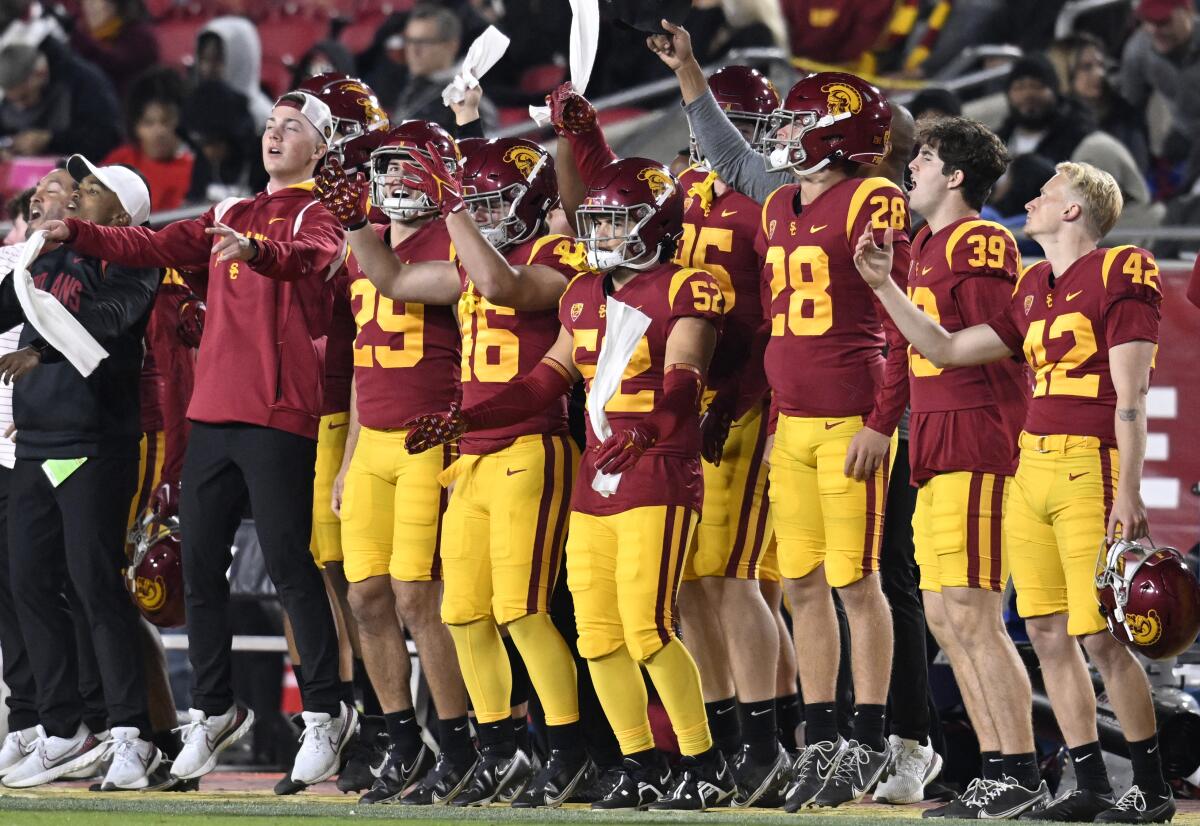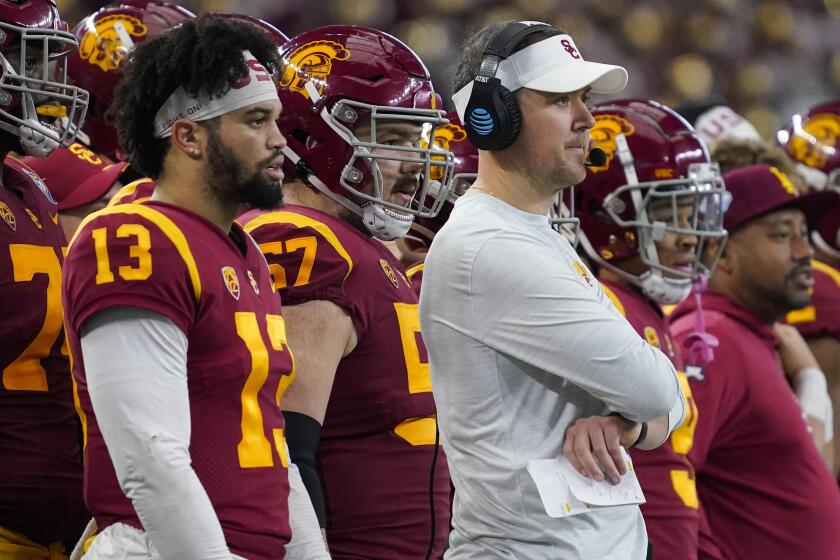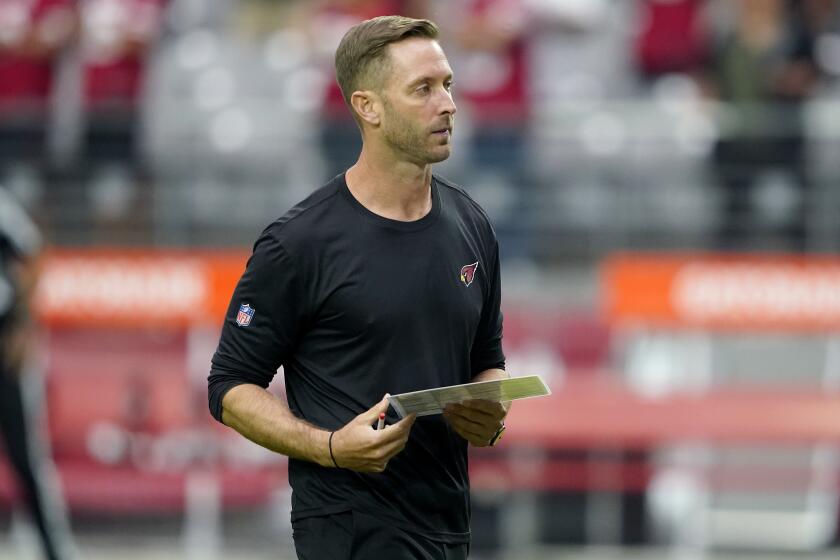A new donor collective launches at USC, where the NIL strategy has shifted

- Share via
Last summer, as USC rolled out its initial plans for navigating the new world of name, image and likeness, the notion of boosters brokering NIL deals beyond the university’s watchful eye was viewed as a potential nightmare scenario. When a donor-led collective arrived at USC by August, the university refused to even acknowledge it. Several other attempts were shot down before they got off the ground.
But any fear of deep-pocketed donors running amok at USC is now a distant memory. Sentiments toward outside collectives on campus have warmed considerably since that icy response, as an entirely different strategy for NIL takes shape within Heritage Hall. One donor-run collective, the Tommy Group, has already launched with the university’s blessing. At least three others are either already aligned with USC and its compliance department or actively vying for that approval.
Victory Formation is one of the new groups raring to join a suddenly crowded field of NIL collectives at USC. Started by Manuel Hernandez, a USC alum and financial advisor to several former Trojans athletes, as well as Jeff McKay, grandson of legendary USC coach John McKay, the group told The Times it intends to function as a full-fledged NIL agency for USC athletes, tapping into a roster of former Trojans athletes to not only help find and facilitate endorsement deals and appearances, but also offer athletes everything from content creation and mentorship opportunities to financial literacy training and legal counsel.
Its arrival marks a fascinating waypoint during a whirlwind start to the NIL era at USC.
Lincoln Riley was asked recently about the school’s new outlook on collectives. The coach wasn’t surprised by the shift in approach to NIL, but admitted that it came about “maybe faster than I expected.”
“We’ve got a couple of different groups that have popped up that are supporting and are going to support our guys and our athletes and want to be able to give them opportunities, which is really, really cool,” Riley said. “And I think it’s going to be a great thing because I think you’re going to have some of these different organizations that are going to be run by USC people and for USC people. I think a lot of our people are going to be excited about getting behind that and supporting that.”
Victory Formation is still awaiting the full stamp of approval from the university. But so far, its leaders say, USC has been “incredibly supportive” of its plans.
“They obviously want us to succeed,” McKay said.
“I know there have been a couple groups that took a run at it in the past,” added Hernandez. “We were able to sit back and see where that’s gone. Now I know we’re geared up and ready to go to execute what we do at a high level, give [football] coach [Lincoln] Riley, give all the coaches across the university the resources their athletes truly deserve.”
Keyshawn Johnson and others have formed the collective Tommy Group to help facilitate NIL deals for USC athletes, including Trojans QB Caleb Williams.
Victory Formation’s agency-based approach to NIL bears some resemblance to what USC once set out to accomplish with BLVD, the third-party NIL group it launched in conjunction with Stay Doubted, an outside media company, last June. The university hoped at the time BLVD might cover all its athletes’ NIL needs — seeking out sponsors, creating social content, selling merchandise and membership subscriptions, all while keeping any potential collectives at bay.
But BLVD never quite found a foothold with USC fans. The university ended its official partnership with the group in October after new NCAA guidance was released clarifying rules on third-party entities representing athletes on a school’s behalf. A new, nonprofit NIL entity, comprised of many of the same people involved with BLVD, is expected to launch soon with the university’s support.
Victory Formation’s founders say it plans to follow a similar model. Like BLVD, they intend to launch a subscription-based membership service, with promise of access to exclusive experiences, merchandise and marketing opportunities with USC athletes.
That sort of access requires a certain level of buy-in from USC, as well as other partners. But Hernandez said he’s confident Victory Formation will have “in-roads and relationships with key constituents that BLVD kind of struggled to tap into.”
“The relationships we all possess at the university are just going to make us much more powerful when it comes to executing this plan,” Hernandez said. “That’s the difference-maker with us.”
The collective is already partnered with Athlete Advantage, an NIL marketing company that manages collectives at DePaul and Kentucky and would fill a similar management role for Victory Formation. Athlete Advantage would also be responsible for monitoring NCAA rule compliance; though, USC appears to be taking a pretty active role in that department.
“You’re going to see the gold standard of collectives,” said Ryan Miller, CEO of Athlete Advantage. “USC and this group, we’re trying to do things the right way, the compliant way.”
But as a sudden rush of collectives floods the marketplace at USC, it’s unclear how the presence of other groups — and the potential competition between them — could change the new dynamic at USC.
Former Arizona Cardinals coach, and Trojans coordinator for a month, Kliff Kingsbury will join Lincoln Riley’s staff as a senior offensive analyst.
When Tommy Group first announced its arrival last month, Keyshawn Johnson, a former star receiver and founder of the collective, was asked how he felt about the prospect of other collectives entering the space. He downplayed the notion that Tommy Group would have to compete with another group.
“Quite frankly, we don’t care,” Johnson said. “We’re not trying to find out who’s involved and what other groups. We’re not in a competition, so to speak. What happens in this space is a lot of people get misinformation that’s put out there in the universe, and they think you have to be in competition.”
The founders of Victory Formation expressed no competitive feelings. Hernandez, who was involved with early conversations about Tommy Group, said he thought the two collectives could work “hand-in-hand.” McKay wondered aloud if they might one day collaborate.
They’ll have to get cleared by USC first, an approval they hope will come soon. Until then, the founders of Victory Formation are left to wait as the landscape continues to change, watching eagerly as other collectives throw their hats into a ring where, just a few months earlier, none were welcome.
More to Read
Go beyond the scoreboard
Get the latest on L.A.'s teams in the daily Sports Report newsletter.
You may occasionally receive promotional content from the Los Angeles Times.









